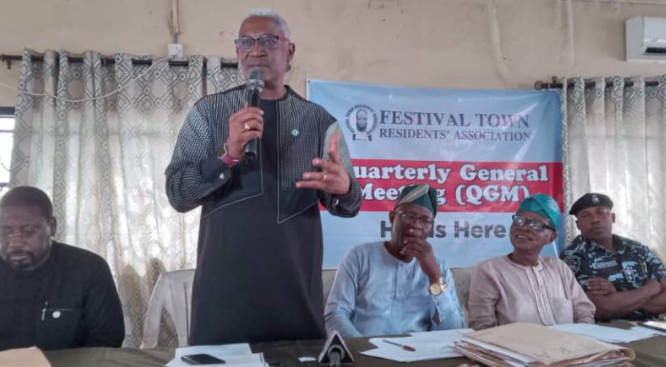News
10,000 Buildings to Give Way for Festac Town to wear its Original Master Plan

By Kayode Sanni-Arewa
The Managing Director of the Federal Housing Authority, Oyetunde Ojo, has said that at least 10,000 buildings will be demolished to return Festac Town to its original master plan.

He also blamed the total collapse of infrastructure in Festac on the failure of those in charge in the past to carry out their constitutional duties, as well as on Amuwo Odofin Local Government and residents.
Hon. Oyetunde Ojo, who gave this indication during the quarterly general meeting of the Festival Town Residents Association held on 512 Road, however, said that they are ready to restore the past glory of Festac Town.
Represented by the Executive Director in the FHA, Architect Ezekiel Ini Etok, Ojo charged the Amuwo Odofin Local Government to prioritize infrastructure development in the area.
He also said that the residents will stand against any move by the FHA to correct the mistakes of the past while promising to collaborate with the council to address the challenges.
The FHA boss explained that he was prepared to serve from day one in line with the mandate given to him by President Bola Tinubu.
He cautioned residents against building without proper approval, adding that weeks of grace would be given to those who are yet to regularize their papers to do so.
On his part, the South West Zonal Chairman of the FHA, Akin Olagbemiro, showcased the agreement signed on the 21st of April, 1988 between the FHA and the council authorities. He said that the Local Government, as the collector of Tenement Rate, shall maintain the roads, drainages, streetlights, and open spaces within the area.
He also said that all avenues in Festac shall be designated as state roads, while all roads and closes shall be under the purview of the Local Government.
Mr. Olagbemiro, however, noted that in 2021, some parts of Festac that were not motorable were fixed at the time.
The President of the Festival Residents Association, Barr. Adeshina Adegbenro, said the entire Festac is facing enormous challenges, including bad roads, irregular power supply, and environmental degradation.
He said every community in the area is faced with peculiar problems, which necessitated the need for the quarterly meeting.
According to him, the residents expect to see positive developments before the end of the year through the intervention of the FHA.
In his speech, Alhaji Olaseeni Ogunjobi, the chairman of Community 2, demanded the assistance of the Federal Housing Authority in restoring Festac Town to its enviable glory.
He lamented that all the existing facilities, including walkways, have been overtaken by vendors of all sorts, with shops illegally erected while vandalism is on the rise within the estate.
The chairman also noted the menace of the cart refuse collectors and their indiscriminate dumping of refuse in any available space within the estate.
He appealed to the FHA Managing Director to help protect Victory Park from land grabbers, adding that the community has 25,000 residents and is the largest of the FTRA communities.
Other stakeholders at the meeting jointly agreed to work with the leadership of the FHA and desist from the lawless acts responsible for the environmental degradation of Festac Town.
News
Court Remands P-Square’s Brother, Ex-Manager Jude Okoye IOver Alleged N1.3B, $1M, £34,000 Fraud

By Kayode Sanni-Arewa
The Economic and Financial Crimes Commission (EFCC) has taken Jude Okoye, the elder brother and former manager of the defunct music duo P-Square, to court over alleged money laundering involving ₦1.38 billion, $1 million, and £34,537.59.
Jude Okoye, along with his company Northside Music Ltd, was arraigned before Justice Alexander Owoeye of the Federal High Court in Lagos on Wednesday, facing a seven-count charge related to financial crimes.
One of the charges states: “That you, Jude Okoye Chigozie and Northside Music Ltd, sometime in 2022 in Lagos, within the jurisdiction of this Honourable Court, did directly acquire a landed property known as No 5, Tony Eromosele Street, Parkview Estate, Ikoyi, Lagos worth ₦850,000,000.00 (Eight hundred and fifty million naira) only, which money you knew or reasonably ought to have known forms part of proceeds of unlawful acts, thereby committing an offence contrary to Section 18 (2)(d) and punishable under Section 18 (3) of the Money Laundering (Prevention and Prohibition) Act, 2022.”
Another charge alleges that Jude Okoye and his company used a Bureau de Change operator to convert $1,019,762.87 (One million nineteen thousand, seven hundred and sixty-two dollars, eighty-seven cents) domiciled in Access Bank Plc into naira and remitted the funds into various accounts with the intent to conceal the source of the money, in violation of the Money Laundering Act.
Jude Okoye pleaded “not guilty” to the charges.
Following his plea, EFCC counsel Larry Peters Aso applied for a trial date and requested that the defendant be remanded in a correctional facility pending trial.
However, defence counsel Inibehe Effiong informed the court of a pending bail application and urged the court to keep Okoye in EFCC custody until the application is heard.
The prosecution opposed the request, citing congestion in EFCC facilities and urging the court to remand him to a correctional centre instead.
Justice Owoeye subsequently adjourned the case to February 28 for a bail hearing and fixed April 14 for trial commencement.
The judge also ordered that Jude Okoye be remanded at the Ikoyi correctional facility pending the determination of his bail application.
News
Funso Ayeni donates N1m, appeals to citizens to support Fisayo Aluko medical needs

By Kayode Sanni-Arewa
Prince Funso Ayeni, an Ikole born philanthropist and politician has donated the sum of N1,000,000 for the support of one Esther Fisayo Aluko Medical needs.
Fisayo Aluko, an Indigene of Ikole LGA part of Ekiti State is currently in need of fund running to millions of Naira to carry out a kidney transplant.
Prince Funso Ayeni made his support known via a Whatsapp platform created for the Indigenes of the LG.
“Good afternoon great citizens,
I am Prince Funso Ayeni (PhD)
I am deeply touched by the condition of Esther Fisayo Aluko, a young lady from Ikole Ekiti, battling kidney issue.
On behalf of myself, my family, and the entire Funso Ayeni Foundation (FAF), I have donated ₦1,000,000 (one million naira) towards her medical treatment ( receipt attached).
“I also appeal to our brothers and sisters from Ikole Local Government, both in and out of government, to rally their contacts and resources to support this urgent cause.
“Together, we can give Esther a chance to live a healthy life again.
News
Naira again falls against Dollar – February 26

By Kayode Sanni-Arewa
The naira is exchanging for ₦1,498 to 1 US Dollar at the parallel market (black market) in Nigeria.
This means that for every one dollar, you can get the equivalent in naira of ₦1,498 on February 26, 2025.
The black market rate signifies the value at which individuals can trade their dollars for naira outside the official or regulated exchange channels.
Note that the Black Market Exchange rate is typically higher than the official exchange rate because it is not regulated by the government
Today’s February 26 exchange shows that the naira has improved against the dollar, as it strengthened compared to what it traded on Tuesday, February 25, when the naira exchanged ₦1,499.
The value of any nation’s currency is determined by aggregate supply and demand.
The forces of supply and demand are themselves influenced by a number of factors, including interest rates, inflation, capital flow, and money supply.
The most common method to value currency is through exchange rates. The two main exchange rate systems are fixed rate and floating rate systems.
Investors and participants closely monitor these parallel market rates for a more immediate reflection of currency dynamics
-

 Metro22 hours ago
Metro22 hours agoSHOCKING! Auto crash claims lives of groom, bride’s sister
-

 News17 hours ago
News17 hours agoCitizenship for sale as Trump announces “Gold Card” Immigration Plan, $5M
-

 News22 hours ago
News22 hours agoSenate votes to send Natasha to face Ethics committee over seat reallocation palaver
-

 News12 hours ago
News12 hours agoAmaewhule, 26 Other Lawmakers Never Defected To APC, Rivers Chair Confirms
-

 News17 hours ago
News17 hours agoSAD! Lady Loses 3-Year-Old Son Hours After Allowing Father Take Him for Weekend Visit
-

 Economy21 hours ago
Economy21 hours agoNigeria’s economy experiencing growth as GDP grows 3.84% in Q4
-

 News21 hours ago
News21 hours agoUK court orders NLNG to pay $380m over undelivered products
-

 Foreign20 hours ago
Foreign20 hours agoDenmark to ban mobile phones in schools







